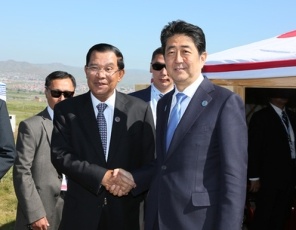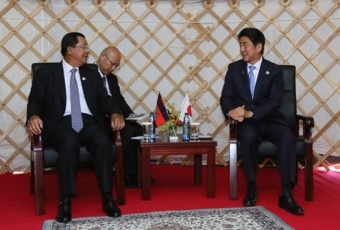Japan-Cambodia Relations
Japan-Cambodia Summit Meeting
July 16, 2016
 Photo: Cabinet Public Relations Office
Photo: Cabinet Public Relations Office
 Photo: Cabinet Public Relations Office
Photo: Cabinet Public Relations Office
On July 16, commencing at 10:55 a.m. until 11:30 a.m., Prime Minister Shinzo Abe, who is attending the 11th ASEM (Asia-Europe Meeting) Summit Meeting (ASEM11) being held in Mongolia, held a meeting with Samdech Akka Moha Sena Padei Techo Hun Sen, Prime Minister of the Kingdom of Cambodia. The overview is as follows.
1 Opening remarks
Prime Minister Abe explained that he is pleased to meet Prime Minister Hun Sen again after meeting him in Malaysia on the occasion of the East Asia Summit (EAS) in November last year, stated that Cambodia is an important country that holds the key to the integration of the Association of Southeast Asian Nations (ASEAN), and noted that this is his seventh meeting with Prime Minister Hun Sen. Prime Minister Abe also expressed the view that the opening of the Tsubasa Bridge to traffic last year is a symbolic contribution by Japan, which supports ASEAN integration, and explained that Japan continues to support Cambodia through initiatives such as exporting quality infrastructure, strengthening Mekong connectivity and developing industrial human resources. Additionally, Prime Minister Abe pointed out that the first direct flights between Japan and Cambodia are scheduled to begin operating in September, and he hopes to further advance the relationship between the two countries as a result of increasing investment in Cambodia by Japanese companies and increasing tourists.
In response, Prime Minister Hun Sen expressed his pleasure to meet Prime Minister Abe again, and agreed with the views on the friendly bilateral relationship that Prime Minister Abe mentioned. Prime Minister Hun Sen expressed the view that today's development of Cambodia is inseparable from Japanese assistance, and he is looking forward to the commencement of the direct flights, which began as an initiative of himself and Prime Minister Abe. Prime Minister Hun Sen also explained that the promotion of trade that he initiated with Prime Minister Abe has reached 1 billion U.S. dollars, Japan is an important partner to Cambodia, and he is delighted to work with Prime Minister Abe.
In response, Prime Minister Hun Sen expressed his pleasure to meet Prime Minister Abe again, and agreed with the views on the friendly bilateral relationship that Prime Minister Abe mentioned. Prime Minister Hun Sen expressed the view that today's development of Cambodia is inseparable from Japanese assistance, and he is looking forward to the commencement of the direct flights, which began as an initiative of himself and Prime Minister Abe. Prime Minister Hun Sen also explained that the promotion of trade that he initiated with Prime Minister Abe has reached 1 billion U.S. dollars, Japan is an important partner to Cambodia, and he is delighted to work with Prime Minister Abe.
2 General discussion on bilateral relations
Prime Minister Abe highly appreciated that the role of Prime Minister Hun Sen in nation building based on Rectangular Strategy, overcoming all sorts of difficulties following the peace process and the deployment of the UN peacekeeping operation (PKO). Prime Minister Abe explained that Japan has consistently extended its utmost support to Prime Minister Hun Sen's efforts for the last quarter century and its stance will not change in the future either. Additionally, Prime Minister Abe explained that Japan appreciates Cambodia's contribution to the international community through the dispatch of PKO personnel, and Japan will continue implementing Defense Capacity Building Assistance in the field of civil engineering that are instrumental to PKO activities. Prime Minister Abe expressed expectation that Cambodia's next election will be conducted in a free and fair manner in order to further strengthen democracy, and stated that Japan will continue to support electoral reform. Following that, Prime Minister Abe mentioned that Kitakyushu, which Prime Minister Hun Sen visited last year along with his visit to Prime Minister Abe's hometown of Shimonoseki, has formed a sister-city relationship with Phnom Penh and stated that he hopes to strengthen the relationship between the two countries at all levels.
In response, Prime Minister Hun Sen expressed his gratitude to Japan for the 20-year friendly relationship, noted that investment from Japan is increasing every year, and stated that he would be grateful if Prime Minister Abe could attract further investment in Cambodia from Japanese companies. Prime Minister Hun Sen explained that he believes the commencement of direct flights will contribute to growth in tourism and investment between the two countries.
Prime Minister Hun Sen also expressed his gratitude for Japan's Defense Capacity Building Assistance, which is contributing to Cambodia's PKO activities. Furthermore, when Prime Minister Hun Sen mentioned that Cambodian peacekeepers dispatched to Mali were injured on the day before yesterday, Prime Minister Abe offered his sympathies to the injured Cambodian peacekeepers and expressed his respect that Cambodia, the country where Japan deployed a full-fledged PKO for the first time, is now contributing to international community by dispatching personnel to PKOs.
Prime Minister Hun Sen expressed appreciation for Prime Minister Abe's sympathies extended to the peacekeepers injured in Mali, and explained that he supports Japan's policies for contributing to peace and hopes Japan will play a larger role for peace within the framework of the United Nations.
Additionally, Prime Minister Hun Sen explained that the electoral reform assistance he requested to Prime Minister Abe on the occasion of Prime Minister Abe's visit to Cambodia in 2013 is achieving concrete results and is establishing the foundation for further consolidation of democracy in Cambodia.
In response, Prime Minister Abe expressed his gratitude for Prime Minister Hun Sen's support for Japan's Proactive Contribution to Peace and Legislation for Peace and Security.
In response, Prime Minister Hun Sen expressed his gratitude to Japan for the 20-year friendly relationship, noted that investment from Japan is increasing every year, and stated that he would be grateful if Prime Minister Abe could attract further investment in Cambodia from Japanese companies. Prime Minister Hun Sen explained that he believes the commencement of direct flights will contribute to growth in tourism and investment between the two countries.
Prime Minister Hun Sen also expressed his gratitude for Japan's Defense Capacity Building Assistance, which is contributing to Cambodia's PKO activities. Furthermore, when Prime Minister Hun Sen mentioned that Cambodian peacekeepers dispatched to Mali were injured on the day before yesterday, Prime Minister Abe offered his sympathies to the injured Cambodian peacekeepers and expressed his respect that Cambodia, the country where Japan deployed a full-fledged PKO for the first time, is now contributing to international community by dispatching personnel to PKOs.
Prime Minister Hun Sen expressed appreciation for Prime Minister Abe's sympathies extended to the peacekeepers injured in Mali, and explained that he supports Japan's policies for contributing to peace and hopes Japan will play a larger role for peace within the framework of the United Nations.
Additionally, Prime Minister Hun Sen explained that the electoral reform assistance he requested to Prime Minister Abe on the occasion of Prime Minister Abe's visit to Cambodia in 2013 is achieving concrete results and is establishing the foundation for further consolidation of democracy in Cambodia.
In response, Prime Minister Abe expressed his gratitude for Prime Minister Hun Sen's support for Japan's Proactive Contribution to Peace and Legislation for Peace and Security.
3 Challenges in the international arena
Regarding the South China Sea issue, Prime Minister Abe explained that resolving regional problems peacefully based on the rule of law is important, the South China Sea issue is an important issue for the peace and stability of the region overall, including Japan, the South China Sea is a vitally important sea lane for Japan, and it is necessary that international law is observed and freedom of navigation is ensured in the South China marine area. Prime Minister Abe explained that Japan had issued a Foreign Minister's statement concerning the final award by the Arbitral Tribunal between the Philippines and China to the effect that the Tribunal's award is final for both the parties concerned and is legally binding. Prime Minister Abe stated that this issue is a matter of the principle of the "rule of law."
In response, Prime Minister Hun Sen explained that Cambodia made an all-out effort in formulating Declaration of Conduct of Parties in the South China Sea (DOC) in 2002, is hopeful that China and ASEAN will peacefully resolve the problem, and believes the full implementation of the DOC and the formulation of a Code of Conduct (COC) should move forward.
At the end of the meeting, Prime Minister Abe explained that interest in Cambodia is remarkably increasing in Japan, and Japanese companies are also expanding investment in Cambodia. Prime Minister Abe stated that Japan will provide support to Cambodia in order to further strengthen the relationship between Japan and Cambodia in the future, including improvement of the investment environment and reinforcement of urban function in Phnom Penh, and he intends to continue communicating closely with Prime Minister Hun Sen, who has been Japan's friend for many years.
Prime Minister Hun Sen stated that he is happy to have been working as Japan's long-time friend up to now, and would like to work with Prime Minister Abe in the future.
In response, Prime Minister Hun Sen explained that Cambodia made an all-out effort in formulating Declaration of Conduct of Parties in the South China Sea (DOC) in 2002, is hopeful that China and ASEAN will peacefully resolve the problem, and believes the full implementation of the DOC and the formulation of a Code of Conduct (COC) should move forward.
At the end of the meeting, Prime Minister Abe explained that interest in Cambodia is remarkably increasing in Japan, and Japanese companies are also expanding investment in Cambodia. Prime Minister Abe stated that Japan will provide support to Cambodia in order to further strengthen the relationship between Japan and Cambodia in the future, including improvement of the investment environment and reinforcement of urban function in Phnom Penh, and he intends to continue communicating closely with Prime Minister Hun Sen, who has been Japan's friend for many years.
Prime Minister Hun Sen stated that he is happy to have been working as Japan's long-time friend up to now, and would like to work with Prime Minister Abe in the future.

